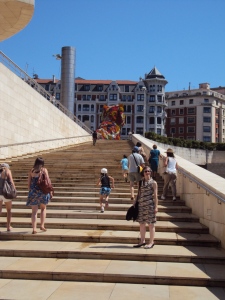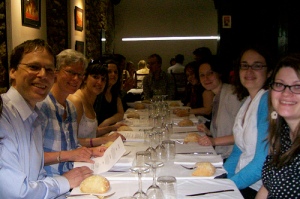I was looking at my posts and realised I didn’t post about my learnings from HTAi12. And there were 2 other events that I attended that I ran out of time to blog about. So here I am, setting down the record before I start attending 2013 events.
HTAi12
My IS colleagues panel session (Tuesday – Accessing Unpublished Evidence) on the reliability of trial registries was very heavily attended (people crammed against the wall and some sitting on the ground – can you believe!). The issues addressed were the development of trial registries and which ones to search and how to search them effectively (for the WHO portal, the best approach is to use a sensitive search in Basic Search), the impact of unpublished trials and the efforts needed to access them (one document successfully wrangled from a pharma company by a Cochrane Review Group was 8500+ pages of data … read the Cochrane timeline here). It is generally known that pharma do not like to publish negative results but what this Cochrane investigation revealed was the startling amount of discrepancies between the results sent to regulatory bodies and the published results. Why can’t Cochrane get the documents from regulatory bodies? Because pharma use ‘commercial in confidence’ stipulations. Also noted was the time taken between collecting trial data and publishing the results. It takes up to 10 years or even more. Question: how deeply does this problem undermine HTAs and systematic reviews?
I learnt from Jackie Street how to use Prezi for an effective presentation. She just had one page of simple shapes and few pictures and didn’t zoom wildly around the screen. Her talk was also interesting in outlining the conflicts between patient/consumer views and concerns, political processes and policy. How to canvas the public’s views about health services is a riddle difficult to solve. Patient advocacy groups can be approached but some have a political agenda and also have fixed views that represent only one section of the population. In a patient/consumer involvement session, I heard about NICE’s patient and public involvement program and the European Patient Forum that works with advocacy groups and patient representatives and helps them to maximise their effectiveness by capacity building and sharing information.
HLInc Annual Conference 2012
This conference occurs every October. And this time, it was my second attendance as a Clinical Librarian at Royal Melbourne Hospital. Like the year before, we split staff attendance into morning and afternoon shifts. I was in the afternoon block which was good because I could meet my husband afterwards for a drink at the Cider Bar. The main part of the second half of the day was showing the results of a survey about library use. It was no surprise that library use has stayed constant or in some cases, has increased, but budgets have remained static or have been reduced. The following part was presented by the new ALIA Executive Director, Sue McKerracher, which was very stimulating. It bascially amounted to – statistics are all very well but it’s what you do with them that counts. She also talked about surprising sources of funding (Disney!) and what could be acheived by asking companies for free products (you’d be amazed what you can get once you try – some companies would see it as low cost marketing). Keeping libraries viable is about connecting with users and creating new services. It was heartening to hear about librarians who have been doing this (once someone pipped up after brief silence from the audience, lots wanted to follow suit with their own innovations).
CAUL Information Literacy Seminar
I thought I would go along to this seminar even though CAUL focuses on academic libraries and as such, university students. The session I got most out of was that given by Nat Enright about Google searching. I’ve read some criticisms of his presentation (yes he mumbled into his beard and read verbatim from a paper – a big no no when presenting) but doesn’t mean that what he was talking about was without value. Google is a very secretive organisation which makes for conflict when their services are so ubiquitous. The way Google presents information in search has now become restricted to location and other information sourced from your Google account. Results are no longer ranked by relevance. This means that students and other users will have to go beyond the first page. There is also the question of power. Google holds enormous social power which should be a concern to librarians. What does Google let you see, what doesn’t it index, who does it collaborate with, and is there political manipulation? My questions but librarians and other users should be thinking about these issues.
My hearing aid battery ran out and I didn’t have any spare on me (grrr – why did I allow this to happen) and so when we had a group activity of designing a box to mimic a new service or product that the library wanted to sell, I got quite bossy. So I was asked to present our product to the audience but I declined because – how did I know there were going to be no questions??? I had fun though! But did I learn anything from that activity? Not really.




